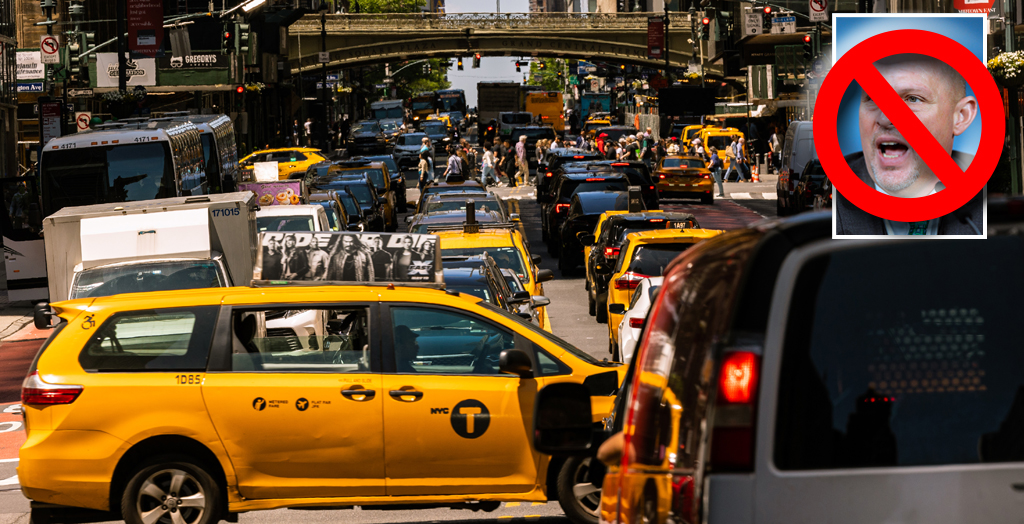In 2019, our state legislature did New York City a huge favor by approving a plan to reduce traffic by charging drivers who enter the most-congested parts of Manhattan and directing the revenue to the MTA. After enduring generations of dysfunctional transportation policies, we could finally begin to create a city where traffic would flow and public transit would be quicker and more reliable.
How much of a no-brainer is this idea? Just look at its range of supporters: Respected leaders in business, labor, economics, and transportation, along with advocates for the environment, safe streets and the poor. They all extol the virtues of congestion pricing and agree that allowing everyone to use our most valuable road space whenever they wish is a recipe for transportation dysfunction and economic inefficiency. They agree that increasing funding for transit helps our environment and benefits those who can’t afford to drive.
The only significant opposition to congestion pricing comes from grandstanding politicians and their ill-informed or self-interested followers. There has been legitimate debate over the fine details of the plan, but no one has raised worthwhile objections to the overall concept; the benefits are just too obvious. Opponents, instead, have tended to center their opposition around misinformation about the plan’s effects or facile objections to being charged for something they prefer to be free.
Thus, I was shocked to learn that Michael Mulgrew, the president of my union, the United Federation of Teachers, recently joined the Trump-supporting borough president of Staten Island's lawsuit to stop this potentially transformative plan. He did so on behalf of just seven teachers who are upset that driving to and from work might become as expensive as, say, taking a commuter train.
Not only was Mulgrew’s move short-sighted and destructive, it also embarrassed many of us proud UFT members. We wonder how the leader of a union of college graduates could engage in this sort of simplistic populism. Instead of explaining the benefits of the plan to members who might not appreciate its importance, he decided to cater to their ignorance or worst instincts.
It’s clear that by reducing traffic and making it easier to move goods and people, congestion pricing would be a boon to our city’s economic health. I once heard a transportation economist observe that congestion is such a drag on the city’s economy that tolling Manhattan’s free bridges would be worthwhile even if the money collected were dumped in the river. But, of course, congestion-pricing revenue would be put to good use – namely helping fund a transit system that is the lifeblood of our region’s economy. Surely, Mulgrew recognizes that a city with a thriving economy is one that can afford to fund its schools and pay its teachers well.
Furthermore, speaking practically, what kind of public-sector union would oppose a plan that raises significant public revenue? The UFT paid a price after remaining neutral on the city’s last big push to enact congestion pricing in 2008. When our transit system subsequently found itself short of funding, the city was forced to come up with billions in extra contributions, thereby shrinking the pool of money available for education.
Mulgrew learned nothing from that experience.
Even more disturbingly, Mulgrew is trying to inflict direct harm upon teachers and students by sabotaging the transit system on which most rely. It is likely that just a handful of union members drive into the congestion zone each day, but tens of thousands of school staff and hundreds of thousands of students ride trains and buses each day. These trips might even involve, as my students sometimes report, buses that are too full to allow them to board. And let’s not forget the millions of transit riders who don’t work in schools, but for whom the system is key to their survival.
Many of these people earn far less than teachers, but apparently are not worthy of Mulgrew’s concern. That the union is funding this effort with dues money paid by transit-riding members, is, frankly, despicable.
Aside from policy concerns, there’s another reason that many of my colleagues and I are outraged by Mulgrew’s action: it is an embarrassment to our profession. As teachers and union members, we’re sensitive to negative stereotypes about us put forth by our political opponents. Mulgrew now seems to be embracing the worst of these alleged traits.
After years of fending off accusations that teacher unions put their own interests ahead of those of children, our union now seeks to make students’ lives harder just to help a few members avoid a toll. Despite being aware of claims that our profession is staffed by people of questionable academic accomplishment, our president tries to block a plan that is backed by just about every respected civic organization and public intellectual on record. And in an environment where critics portray civil servants as having an inflated sense of entitlement, Mulgrew makes a straight-faced argument that teachers somehow shouldn’t be subject to the same toll as everyone else.
My most generous take on Mulgrew’s act is that it was merely a misguided political stunt. He likely thought he could curry favor with the less-informed, reactionary members of our union and then wait for his lawsuit to be dismissed without any harm inflicted on the public. But the damage to our reputation has been done.
It’s time to fix that damage. The UFT needs to withdraw from the lawsuit and join the fight to improve our transportation system and create cleaner and more equitable city. The public needs to know that teachers have their best interest at heart, and transit-riding teachers need to know that our union knows we exist.






